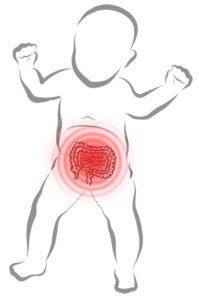What Is Necrotizing Enterocolitis (NEC)?
 Necrotizing enterocolitis is a serious pediatric intestinal problem that mainly affects premature and low-birth-weight infants. According to Cleveland Clinic, 9 out of 10 infants who get NEC are born early.
Necrotizing enterocolitis is a serious pediatric intestinal problem that mainly affects premature and low-birth-weight infants. According to Cleveland Clinic, 9 out of 10 infants who get NEC are born early.
NEC attacks intestinal tissue and causes it to die. The word “necrosis” means to cause the death of tissue.
When the tissue dies it can cause a perforation in the baby’s intestinal wall. Bacteria can then spill into the bloodstream or waste can pass into the belly and sicken the child. As a result, a surgeon may need to remove part of the injured intestine.
In most cases, necrotizing enterocolitis develops 2 to 6 weeks after birth and strikes about 1 in 2,000 to 4,000 births.
Necrotizing Enterocolitis Causes
Exact causes of necrotizing enterocolitis are unknown. However, several risk factors increase the likelihood that a child will end up with NEC.

For example, premature infants have weaker immune systems and may not be able to fight infections as well as full-term babies. And their digestive systems are more fragile, which means they are prone to intestinal infections.
In addition, a number of studies have shown that premature babies have a greater chance of developing NEC if fed cow-based baby formula or milk fortifiers.
Baby formula brands that have been connected to NEC include Enfamil™ and Similac®.
The only consistent observations made in infants who develop NEC are the presence of prematurity and formula feeding.
– Children’s Hospital Los Angeles
Parents should be aware that formulas made from cow’s milk may lead to NEC and life-threatening complications. Knowledge of NEC symptoms could help you keep your child safe.
Babies who experienced a difficult birth or birth trauma or had low oxygen levels at birth are also more likely to develop NEC. When there is insufficient oxygen, the body sends blood and oxygen to the brain and heart, which reduces blood flow to the intestines.
A baby formula lawsuit is a type of product liability lawsuit.
Necrotizing Enterocolitis Symptoms
While some infants with NEC have mild symptoms, others experience life-threatening health problems. Symptoms may appear over a few days or suddenly in babies who seemed to have been thriving.
In many cases, the first sign of NEC is an infant’s inability to tolerate feedings.
- Abdominal distension
- Apnea (pauses in breathing)
- Belly pain
- Bloating
- Blood pressure or heart rate changes
- Bloody stools
- Bluish or reddish belly
- Diarrhea
- Fluctuating body temperature
- Green vomit
- Low energy
- No weight gain
By learning and looking for the symptoms of NEC, you may be able to protect your child from the worst health consequences of this terrible disease.
If your child shows signs of necrotizing enterocolitis, seek medical attention as soon as possible. The sooner your child is diagnosed and receives treatment, the better the prognosis.
When left untreated, NEC can lead to chronic illness and death in the worst-case scenario.
The birth injury law firms in our network may be able to help with a claim for compensation. Contact us today for a free case review.
How Is Necrotizing Enterocolitis Diagnosed?
Your pediatrician or other health care practitioner will examine your child and look for NEC symptoms.
They may order tests such as:
- Blood tests to look for bacteria and signs of infection
- Fecal test to detect small amounts of blood in the stool
- Needle insertion in the belly to find intestinal fluid indicating a hole in the intestines
- X-rays of the abdominal cavity, which can show gas bubbles signaling bowel damage
While necrotizing enterocolitis can be scary, neonatology staff members are trained to detect this condition in their vulnerable patients.
Necrotizing Enterocolitis Treatment
Once your child is diagnosed with NEC, they can begin receiving treatment to get better. Your doctor will determine the course of treatment best suited to your child’s illness.
Typically, medical professionals stop oral or tube feeds (enteral feeds) and order intravenous (IV) fluids and nutrients. This allows the infant’s intestines to rest and heal.
It is not unusual for a mother to feel guilty about stopping feedings. Just remember that you are helping your baby heal.
Other treatment options include:
- Antibiotics to fight infection
- Nasogastric (NG) tube to suck out gas and fluids
- Surgery
- Abdominal X-rays to monitor the progression of the condition
Surgery and Other Interventions
 Cleveland Clinic reports that 1 in 4 babies require surgery to remove dead intestinal tissue and fix an intestinal perforation.
Cleveland Clinic reports that 1 in 4 babies require surgery to remove dead intestinal tissue and fix an intestinal perforation.
Doctors may also perform an ostomy, a procedure in which a hole (stoma) is made in the child’s belly to allow waste to leave the body and drop into a bag.
Babies who are too small or sick for surgery may be implanted with a drain (catheter) in the stomach to remove infected fluids or gas. The doctor may postpone surgery until the child is bigger and stronger.
Fortunately, most infants with NEC do not need surgery. In many cases, babies who respond well to treatment can resume feedings in one or two weeks. Breast milk is recommended. When breastfeeding is not an option, doctors typically recommend feeding the infant pasteurized human breast milk from a milk bank or special formula.
If your child needed surgery for NEC after being fed formula or fortifier made of cow’s milk, we may be able to help. Contact LawFirm.com today, and one of our team members will walk you through a free case review.
Preventing Necrotizing Enterocolitis in Newborns
First, it is essential to note that not all NEC cases are preventable. However, parents can take some steps to lessen their child’s likelihood of developing this condition.
- If possible, feeding the baby breast milk or formula made from non-cow’s milk
- Learning the symptoms of NEC
- Scheduling regular well checks with a pediatrician
Women at risk for a preterm birth can get steroid injections to boost their unborn child’s health.
Research also shows that probiotics (healthy bacteria) added to formula may decrease the risk of NEC.
Complications of Necrotizing Enterocolitis
About 8 in 10 babies with NEC survive, according to Cleveland Clinic. Those who do pull through often experience worrisome complications.
Some examples of NEC-related health complications include:
- Developmental delays
- Growth failure
- Infection in the belly
- Intestinal structures (narrowed intestines)
- Peritonitis (inflammation of the membrane lining the abdominal wall)
- Sepsis
- Short bowel syndrome
Children with intestinal strictures may need surgery to open up narrowed intestines so food can pass through.
Children who have surgery for NEC and lose a large section of the intestine often have nutritional issues. They may need IV nutrition until the damaged intestine heals and can tolerate regular feeding.
When NEC is left untreated, it can result in devastating consequences. One example is sepsis, a deadly blood infection.
Necrotizing Enterocolitis Long-Term Effects
Most babies with necrotizing enterocolitis make full recoveries.
Sadly, some children with severe cases will experience long-term health effects like chronic digestive problems and neurological issues.
Children with short bowel syndrome, which affects the body’s ability to absorb nutrients, often require lifelong care to obtain the nutrition they need to grow. Some may need tube feedings.
What Are Risk Factors for Necrotizing Enterocolitis?
Preterm and low-birth-weight babies are most likely to develop NEC.
More specifically, infants with these characteristics are most at risk:
- Birth weight of less than 5 ½ pounds
- Born before the 37th week of pregnancy
- Fed via a tube in the stomach (enteral nutrition)
The smaller and earlier the baby, the higher the risk for NEC.
— Stanford Children’s Health
Babies who weigh less than 2 pounds face the most significant risk of NEC.
Sometimes babies are fed cow milk-based formulas while receiving care in a neonatal intensive care unit (NICU).
Can I File a Necrotizing Enterocolitis Lawsuit?
You may be able to file a baby formula lawsuit if your child was:
- Premature or had a low birth weight
- Fed formula or fortifier made of cow’s milk
- Diagnosed with necrotizing enterocolitis (NEC), had severe intestinal problems, or needed surgery to relieve symptoms
Even if your child had NEC years ago, you could still have a case. If your child suffered and that suffering was preventable, you have a right to seek justice.
If you have a case, the experienced birth injury law firms in our network can guide you through the legal process. There are never out-of-pocket costs or upfront fees. Call (888) 726-9160 today to get the process started.
FAQs About Necrotizing Enterocolitis
What does it mean when a baby has NEC?
NEC refers to necrotizing enterocolitis, a serious intestinal disease that often sickens premature babies. The condition causes the death of intestinal tissue.
Infants may need treatments ranging from antibiotics to surgery to get better.
Tragically, some infants die from NEC complications, and others experience lifelong digestive issues and other health problems.
How common is necrotizing enterocolitis?
In premature babies, NEC is a relatively common intestinal illness. It affects 1 out of 1,000 preterm infants.
The condition is rarer in full-term babies. The incidence rate involving full-term infants is about 1 in 10,000.
Is necrotizing enterocolitis fatal?
The morbidity rate of NEC is significant. Tragically, about 2 of 10 infants with necrotizing enterocolitis will die. Those who do survive often have long-term health problems and food malabsorption issues that require special medical treatment.
If your child has necrotizing enterocolitis or passed away from this devastating disease, the birth injury lawyers in our network might be able to help you file a claim. Please get in touch with our team at LawFirm.com for a free legal evaluation.
Do babies get necrotizing enterocolitis from formula?
The precise cause of necrotizing enterocolitis is not known. However, there are different theories explaining why NEC targets premature babies. According to Children’s Hospital Los Angeles, infants with NEC tend to have two things in common — prematurity and being formula fed.
A preterm infant’s immature lungs and intestines place them at risk for this terrible illness.
What formula causes necrotizing enterocolitis?
While much remains unknown about the causes of NEC, researchers have found a link between the disease and formula and fortifier made from cow’s milk, including popular formulas manufactured under the brand names Enfamil and Similac.
Mead Johnson manufactures Enfamil, and Abbott Nutrition makes Similac.
 Get Legal Help Now
Get Legal Help Now
